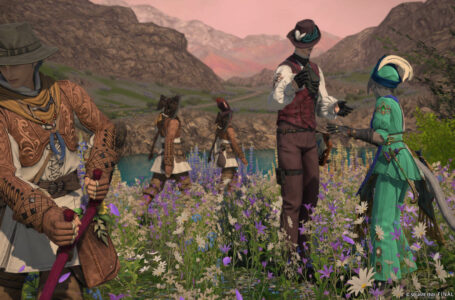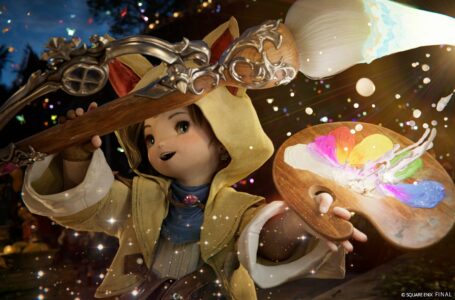Final Fantasy XII The Zodiac Age Review (PS4)
It’s easy to see why the twelfth entry in the Final Fantasy series is so divisive. It’s just so different. The Zodiac Age remaster steps it up to another level, and hugely improves the original experience. As one of our favourite Final Fantasy games, it’s never been better.
Final Fantasy XII The Zodiac Age is actually based on the Japanese exclusive enhanced version of the original game, Final Fantasy XII International Zodiac Job System, for PS2. While English fan patches of that version have existed for a while, for many in the west this will be the first time experiencing that version’s substantial changes. Not to mention The Zodiac Age adds even more on top.
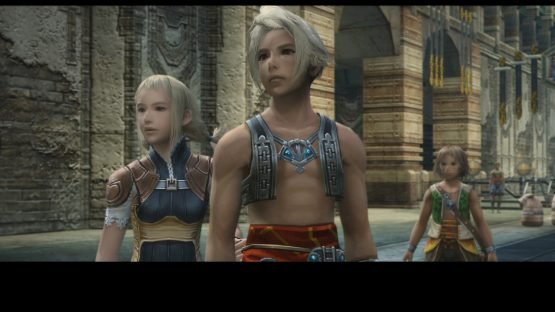
The story is absolutely fantastic, and certainly one of the best in the series, packed with politics and intrigue. Penned and directed by Yasumi Matsuno, Final Fantasy XII is set in the world of Ivalice, shared by his prior works Final Fantasy Tactics and Vagrant Story (though the story itself has little to do with either). Set two years after a devastating war, the story begins in the desert Kingdom of Dalmasca, occupied and oppressed by the menacing and powerful Archadian Empire after they assassinated the Dalmascan King during peace treaty agreements.
We’re introduced to Vaan & Penelo, two youths living in poverty on the streets of Rabanastre, Dalmasca’s Capital. As with many others, both lost those they loved in the war. While Vaan has to pickpocket to survive, he dreams of one day becoming a sky pirate — airships being commonplace in Ivalice, for both travel and military purposes. After Vaan meets up with sky pirates Balthier and Fran, they all become involved in grand events revolving around the liberation of Dalmasca, repelling Archades, and reclaiming the throne.
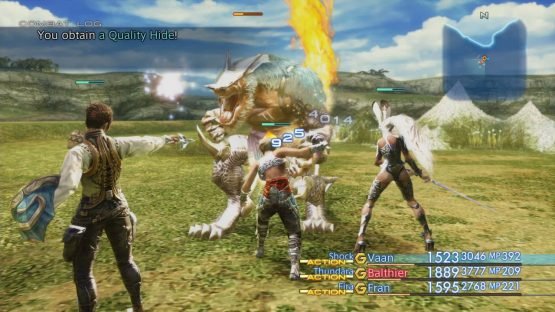
Excellent diverse casting gives Ivalice the flavour of being an actual world.
The “reclaim your throne” tag was actually used to advertise Final Fantasy XV, the most recent numbered entry in the series. It’s actually surprising in retrospect how many story beats are the same between the both. However, a lot of those similar beats happen off camera in XV, or in its spin-off media. Anyone worried XII’s story might not hold up these days will be relieved, as it’s still great. The political nature of the plot can get complex at times, but never too much. Subtle threads here and there weave extra depth into the world, including some entirely optional areas, like exploring the Necrohol of Nabudis and its surrounding deadlands.
Even playing it again I was enraptured with the storytelling. It helps that XII has one of the best video game localisations in terms of script and voice acting. It’s so well-written in English it’s almost surprising it’s not the original language, and the excellent diverse casting gives Ivalice the flavour of being an actual world, with people from different areas having different accents and speech patterns. One race even speaks in iambic tentrameter and pentameter, a decision with a lot of thought put into it and one that works wonderfully well for reasons I won’t go into due to potential spoilers.
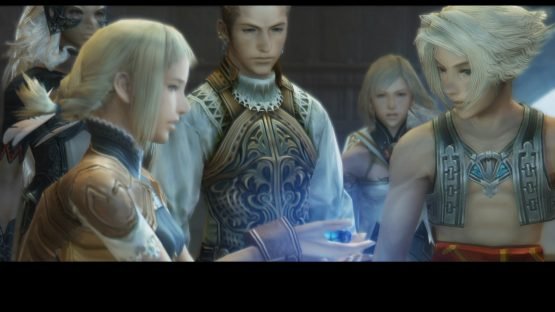
Not only is it a great story in a believable fantasy world, but one that touches on issues in our own real world. It resonates.
It’s a smart story that does away with shades of black and white. There’s a reason Matsuno’s work was already so celebrated before even working on XII. Even the different factions in Ivalice have their own internal struggles, and what’s right and what’s wrong isn’t as simple as it first appears. It delivers deftly on themes of freedom, destiny, and war — with a pretty strong anti-war message, and has some clear parallels with the arms race and nuclear war. Not only is it a great story in a believable fantasy world, but one that touches on issues in our own real world. It resonates.
Some of these themes and issues are so huge and sweeping in scope, that while Vaan and Penelo might have been good protagonists in other stories, their woes feel a bit minuscule in comparison to some of the high stakes. You could argue that’s sort of the point — how these huge issues affect the “common people” even worse than the “elite — but in many cases it just leads to lines that fall pretty flat, characters eye rolling at Vaan just as much as the player. The other four party members, and even most of the guest party members, carry a lot more weight.
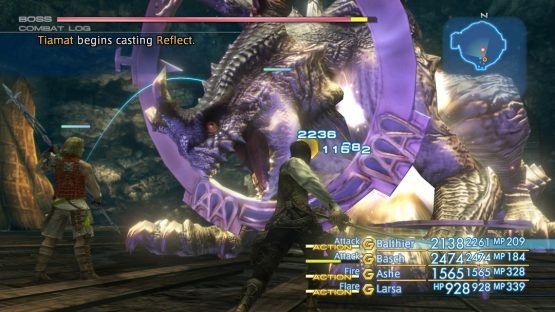
But enough about the story that is really, really good. How does Final Fantasy XII play? Well, different, as I already said and you all probably know as the game did originally come out over 10 years ago. This was the first “main game” in the series to do away with random encounters and turn based combat (that’s if you don’t include Final Fantasy XI, an MMO). Enemies roam around the huge maps and sprawling dungeons, and you just sort of fight them right then and there.
Building the right strategy for your team to take on a boss or an area is extremely satisfying.
All party members can be controlled manually — attacks, magicks of all the colours (white, black, green, time, arcane), items, technicks (special moves with no MP cost), and of course summons and quickenings (this game’s version of limit breaks). As opposed to waiting for an action bar to fill, a bar fills up to sort of “charge” what you’ve selected. Different actions take different amounts of time (items are instant), and you can queue a move to charge next once you’re carrying out an action. If it sounds laborious to do this with every character constantly then you’re right. But thankfully you’re not really meant to do much of this yourself (though you can if you want to).
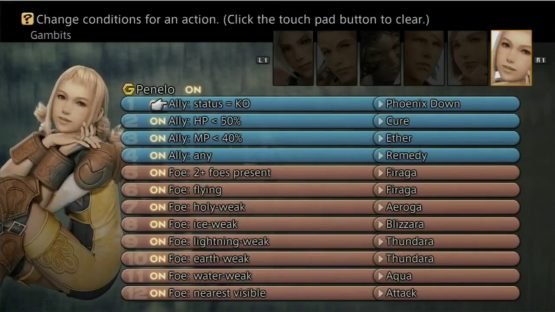
That’s where Gambits come in. Essentially these are very simple IF statements you can create for each party member, telling them to do specific actions in certain conditions. These can range from telling your squad to make sure they all target their attacks on the same monster as the party leader, to getting your white mage to cast cure on anyone whose health drops below 70%.
There’s a massive amount of depth to the system, allowing you to account for a whole host of possibilities, or you can keep it basic and light if you want, managing the more complex stuff yourself as it rolls in. You’ll often need to tweak these later on as enemies get harder, and present more unique situations and challenges. Building the right strategy for your team to take on a boss or an area is extremely satisfying.
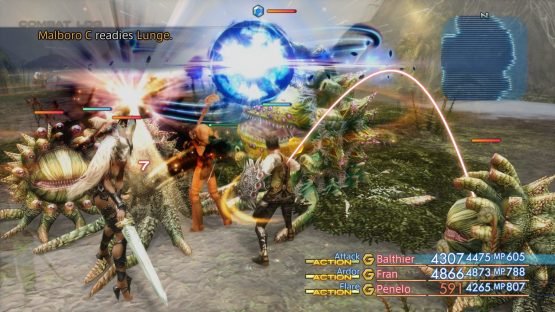
The option to speed things up to make it easier to see everything the game has to offer is fantastic, and very respectful of player time.
The International Zodiac Job System brought with it a lot of changes, mostly for the better. For starters it allowed “fast forward” of exploration and battles to twice the speed. This can now be doubled in Zodiac Age (so, 4x speed), and tweaks have been made to the way the game fast forwards to make it easier to manage and actually play. The total size of all the maps and dungeons in XII is huge, so having the option to speed things up to make it easier to see everything the game has to offer is fantastic, and very respectful of player time. Things like music don’t speed up, and it doesn’t affect cutscenes, so it simply feels like a weird looking sprint.
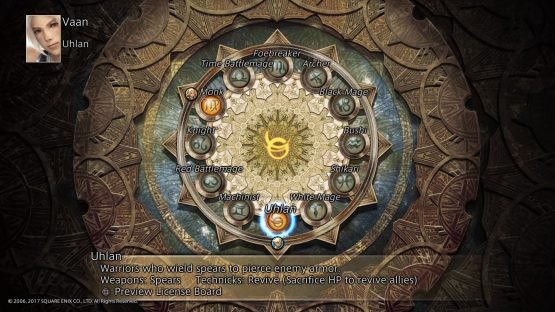
As the title of the original re-release suggests, it also added a job system. The original XII didn’t really have one. All characters shared the same “license board”, which is how you spec what characters can do as they level up. Problem was, with everyone having the same board, they all ended up feeling mostly the same towards the end. Now you have a choice of 12 jobs for each of the 6 party members, each with their own license board, and they all feel unique as a result.
What’s great is that in the Zodiac Age each character can now have two jobs (unlocked at about a third of the way through the game, a little bit after you get the first mandatory summon in the game), so all of the jobs can now be experienced. It now feels like each character has a use, and that you’re making more specific progress with them as you level up. One issue with the boards is that some areas of it can only be accessed after unlocking specific summons. Each summon can only be claimed by one party member, but the mileage of what that square of the board will allow you to access (if any) varies immensely. Without careful consideration, you may end up accidentally locking some of your party out of pretty useful license board options.
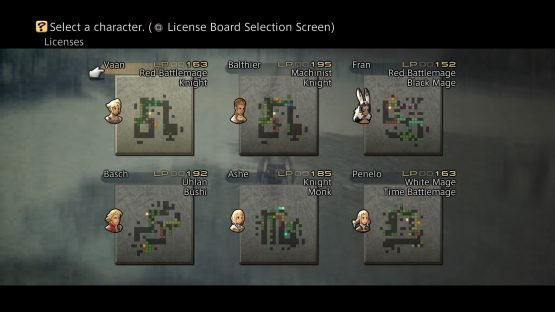
A trial mode was also added to the International Zodiac Job System. This is a bonus challenge where you can take your party at any point to a 100 level gauntlet of enemies to unlock license points and rewards. These get super hard and challenging, forcing you to change up your gambits frequently — it was specifically designed to mess around anyone who tries to make it through with a “one fits all” gambit layout.
It’s best used as a post-game challenge, as later stages get very hard, and it’s great to see an extra challenge to make use of optional late-game weapons and the like. Juggling your saves around to make sure you applied your rewards to your game without accidentally messing up and deleting your main save was marginally fiddly before, but it’s all as smooth as Vaan’s no-longer-painted-on-abs-stomach in this Zodiac Age version.
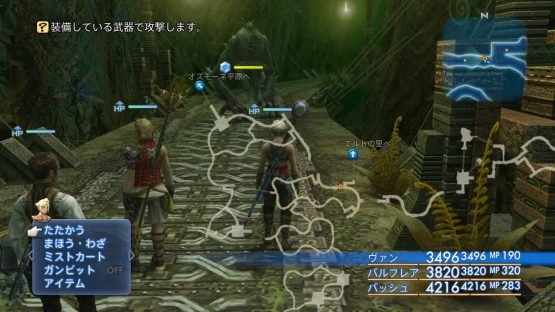
There were also a bunch of small tweaks too, to some of the stats that level up, some of the magic categorisation, and the way quickenings work (they used to cost MP but now have a separate metre). One annoyance is that some spells you could simply buy before you now have to find in specific locations, meaning that if you want Cleanse, one of the only ways to remove the ridiculous Disease status, you’ll need to make sure you find it. Add to this the somewhat annoying way treasure works in XII in general (most chests are randomised in either appearance rates or what they can contain), and you’re bound to run up against some annoyances in terms of getting what you feel you need without some sort of guide.
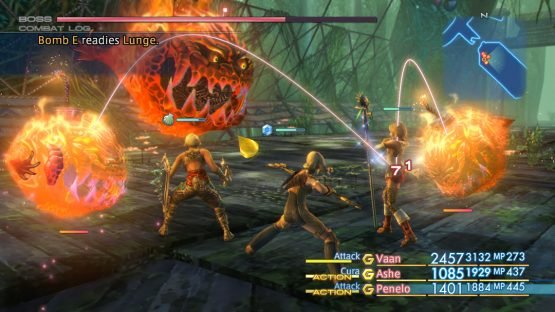
A re-orchestrated score gives the original soundtrack a bit more oomph this time around.
The Zodiac Age itself also makes some of its own improvements on top of those. Thanks to foresight on the part of the game’s developers the game now looks stunning visually — the game was originally made with higher resolution than necessary assets in case it would be remastered in the future. The audio too has been remastered, including a re-orchestrated score that gives the original soundtrack a bit more oomph this time around (though you can toggle between the two in the menu).
It also gives the new option to switch between the English or Japanese dub, though as mentioned before, this is one English localisation that is particularly superb. But it’s always nice to have the option to experience things in a new way. There’s also now camera inversion options, shorter load times, a handy transparent map overlay, and auto-save as you move between zones that’s auto-saved my ass in more than a few situations.
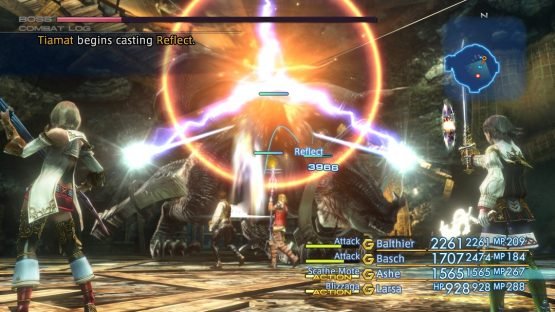
The definitive way to play Final Fantasy XII.
If you didn’t get through XII the first time around, you may find the improvements and enhancements in this double dose of upgrades will make it more appealing. Fans of the original game will also love all of the extra content and tweaks on offer in the Zodiac Age. There might be the odd niggle, but it’s a drop in the ocean when you consider how much of XII is still fantastic to this day.
The core of Final Fantasy XII holds up incredibly well — those who already have XII on the top of their list of Final Fantasy games will have their feelings confirmed, and this remaster may even see it go up a few notches of those that don’t. This is the definitive way to play Final Fantasy XII, and the Zodiac Age definitely makes it better than ever. Ivalice is a huge world to explore, packed with depth — and Final Fantasy XII The Zodiac Age makes it more of a joy to adventure through than ever before.



